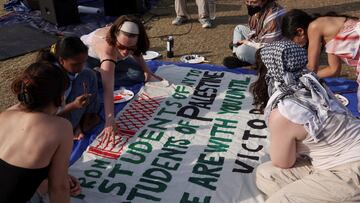Pro-Palestinian protests in universities: What is divestment and why do students demand it?
Universities across the US have been calling in police to clear out encampments where protesters are calling for their institutions to divest from Israel.

Since October, university students across the United States have been protesting the heavy-handed Israeli response to the Hamas invasion and taking of roughly 240 hostages. The Hamas attack left over 1,200 dead in Israel whose retaliatory military operation has resulted in the death of over 34,000 Palestinians in Gaza and a growing humanitarian crisis.
School administrators have begun cracking down on pro-Palestinian protests, calling in police to clear out encampments on campuses. While the goals vary from institution to another, many are demanding that their college divest any financial stakes they may have in the Israel-Hamas war.
Pro-Palestinian protests in universities: What is divestment and why do students demand it?
The pro-Palestinian protesters want their universities to not be complicit with the actions of the Israeli military through financial investments in Israel or companies that have links with the nation or are profiting from the Israel-Hamas war, among other demands. Many are calling for transparency of their university’s investments, especially the endowment funds.
There has been a long history of student protesters targeting university endowments to make a statement and express disapproval while calling for change. However, according to CNN there is very little correlation between divestment campaigns and actual impact on corporations. Studies carried out looking at past divestment movements found that there was “almost no effect on share price.”
This is thought to be because shares and operations are reallocated from “socially responsible” parties to others who are more indifferent. Furthermore, there generally aren’t “enough sellers and few enough buyers to actually change the cost of capital,” according to Witold Henisz, vice dean and faculty director of the environmental, social and governance initiative at The Wharton School of the University of Pennsylvania speaking to CNN.
While that may be the case, the true value of a divestment campaign rests in the increased awareness the movements create as well as “stigmatizing partnerships with targeted regimes or industries,” proponents of the movements counter.






